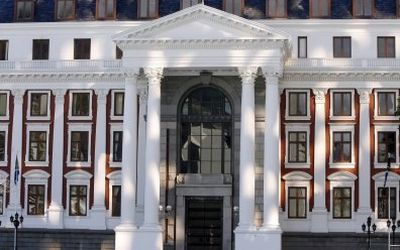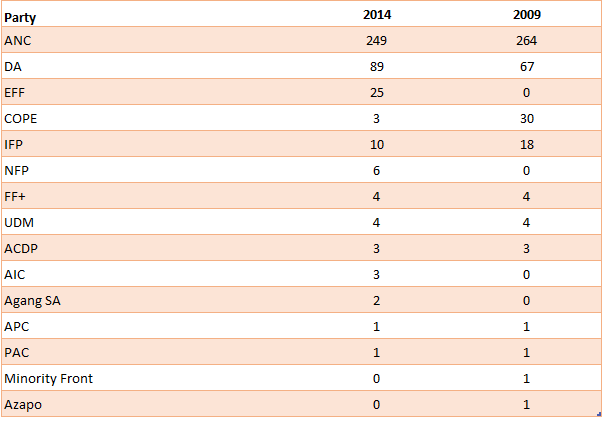THE African National Congress (ANC) has dropped to the lowest number of seats it will occupy in the National Assembly in 20 years.
The Democratic Alliance (DA) will be the biggest winner of seats in the 400-member National Assembly, while the Congress of the People (COPE) will be a shadow of itself.
Preliminary calculations by independent elections observer Michael Atkins shows that the ANC will drop to 249 seats from the previous 264 it held after the 2009 national and provincial elections.
The DA will rise to 89 seats, the highest number it has ever held, after having 67 seats won in the 2009 elections.
"The DA really mobilised their support base for these elections. They also definitely ate into the support base of the African Christian Democratic Party (ACDP) and several of the other smaller ones," Mr Atkins said on Saturday.
However, he does not believe that the DA was able to attract many of the disgruntled COPE supporter base.
COPE, which held a block of 30 seats has dwindled to three seats after seeing its voter base all but evaporate and experienced the defection of 24 of its MPs to the ANC.
COPE leader Mosiuoa Lekota bit into a hat on Friday as the media held him to his word after he said he would eat his hat if his party did worse in the elections.
However, Mr Lekota could take some satisfaction from Mr Atkins’ analysis. "From what I can see so far not one of COPE’s MPs who defected to the ANC will make it to the National Assembly as they are too far down on the ANC list."
The third biggest party in the National Assembly will now be the Economic Freedom Fighters (EFF) with 25 seats.
"The EFF seemed to attract some black voters who were unhappy with the ANC, who may have voted for the DA as a protest vote, but then found a reason to vote for the EFF," Mr Atkins said.
The Inkatha Freedom Party (IFP) will see the number of seats it held being chopped from 18 to 10, while the National Freedom Party (NFP), which is an IFP offshoot, will gain six seats for the first time.
"The split caused by the NFP shows clearly in the IFP vote," Mr Atkins said.
The United Democratic Movement (UDM) and the Freedom Front Plus (FF+) each retain four seats in the National Assembly.
"It seems that some supporters of those two smaller parties split their votes going with the DA on the national ballot and then with their parties for a provincial ballot," Mr Atkins said.
Because of the high voter turnout the number of votes per National Assembly seat works out to be 44,006, or 0.25% of the total number of votes cast.
This would make nine seats available to the smaller political parties.
This meant that ACDP would have three seats, the same as it had after 2009.
Newcomers Agang SA and the African Independent Congress will have two and three seats respectively.
The African People’s Congress and the Pan Africanist Congress (PAC) will each have one seat.
"The formula used to calculate the allocation of votes for left over seats is fair in that it favours the smaller parties who do not have the resources of the larger parties to contest elections," Mr Atkins said.
A total of 24 parties contested the 2009 national elections. Thirteen obtained seats in the National Assembly

Parliament in Cape Town. Picture: SUNDAY TIMES
THE African National Congress (ANC) has dropped to the lowest number of seats it will occupy in the National Assembly in 20 years.
The Democratic Alliance (DA) will be the biggest winner of seats in the 400-member National Assembly, while the Congress of the People (COPE) will be a shadow of itself.
Preliminary calculations by independent elections observer Michael Atkins shows that the ANC will drop to 249 seats from the previous 264 it held after the 2009 national and provincial elections.
The DA will rise to 89 seats, the highest number it has ever held, after having 67 seats won in the 2009 elections.
"The DA really mobilised their support base for these elections. They also definitely ate into the support base of the African Christian Democratic Party (ACDP) and several of the other smaller ones," Mr Atkins said on Saturday.
However, he does not believe that the DA was able to attract many of the disgruntled COPE supporter base.
COPE, which held a block of 30 seats has dwindled to three seats after seeing its voter base all but evaporate and experienced the defection of 24 of its MPs to the ANC.
COPE leader Mosiuoa Lekota bit into a hat on Friday as the media held him to his word after he said he would eat his hat if his party did worse in the elections.
However, Mr Lekota could take some satisfaction from Mr Atkins’ analysis. "From what I can see so far not one of COPE’s MPs who defected to the ANC will make it to the National Assembly as they are too far down on the ANC list."
The third biggest party in the National Assembly will now be the Economic Freedom Fighters (EFF) with 25 seats.
"The EFF seemed to attract some black voters who were unhappy with the ANC, who may have voted for the DA as a protest vote, but then found a reason to vote for the EFF," Mr Atkins said.
The Inkatha Freedom Party (IFP) will see the number of seats it held being chopped from 18 to 10, while the National Freedom Party (NFP), which is an IFP offshoot, will gain six seats for the first time.
"The split caused by the NFP shows clearly in the IFP vote," Mr Atkins said.
The United Democratic Movement (UDM) and the Freedom Front Plus (FF+) each retain four seats in the National Assembly.
"It seems that some supporters of those two smaller parties split their votes going with the DA on the national ballot and then with their parties for a provincial ballot," Mr Atkins said.
Because of the high voter turnout the number of votes per National Assembly seat works out to be 44,006, or 0.25% of the total number of votes cast.
This would make nine seats available to the smaller political parties.
This meant that ACDP would have three seats, the same as it had after 2009.
Newcomers Agang SA and the African Independent Congress will have two and three seats respectively.
The African People’s Congress and the Pan Africanist Congress (PAC) will each have one seat.
"The formula used to calculate the allocation of votes for left over seats is fair in that it favours the smaller parties who do not have the resources of the larger parties to contest elections," Mr Atkins said.
A total of 24 parties contested the 2009 national elections. Thirteen obtained seats in the National Assembly















 News, views and analysis of South Africa's national and provincial elections
News, views and analysis of South Africa's national and provincial elections







Change: -0.47%
Change: -0.57%
Change: -1.76%
Change: -0.34%
Change: 0.02%
Data supplied by Profile Data
Change: -1.40%
Change: -0.42%
Change: -0.47%
Change: 0.00%
Change: -0.47%
Data supplied by Profile Data
Change: 1.21%
Change: 1.37%
Change: 1.02%
Change: 0.88%
Change: 1.17%
Data supplied by Profile Data
Change: -0.01%
Change: -0.52%
Change: 0.20%
Change: -1.38%
Change: -2.05%
Data supplied by Profile Data